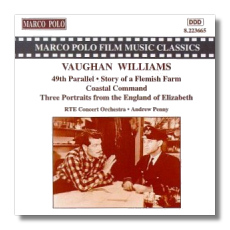
The Internet's Premier Classical Music Source
Related Links
- Vaughan Williams Reviews
- Latest Reviews
- More Reviews
-
By Composer
-
Collections
DVD & Blu-ray
Books
Concert Reviews
Articles/Interviews
Software
Audio
Search Amazon
Recommended Links
Site News
 CD Review
CD Review
Ralph Vaughan Williams

Film Music
- 49th Parallel: Prélude
- Story of a Flemish Farm Suite
- Coastal Command Suite
- Three Portraits from The England of Elizabeth
RTÉ Concert Orchestra/Andrew Penny
Marco Polo 8.223665
In 1940, Vaughan Williams mentioned to fellow-composer Arthur Benjamin that he would like "a shot" at film music. Benjamin passed this information on to Muir Mathieson, probably the single greatest influence in British film music, since he went out and signed up leading composers for his studio: Britten, Walton, Benjamin, Frankel, Lambert, Bax, Berners, as well as Benjamin and Vaughan Williams. Consequently, Vaughan Williams received a phone call to work on the film 49th Parallel. Asking how long he would have to work on the music, the composer received the reply, "Until Wednesday." I have no way of knowing if this was indeed the case, but Vaughan Williams welcomed the pressure as a salutary discipline. "When the hand gets lazy, the mind gets lazy as well," to quote him, echoing the evangelicalism of his Wedgewood ancestors. He scored, all told, eleven films, including Scott of the Antarctic (whose music he appropriated for his seventh symphony) and The Vision of William Blake (whose music he published as 10 Blake Songs for voice and oboe).
As to most of the music recorded here, I don't know whether the composer arranged the suites or whether someone like Muir Mathieson did the honors, since he performed this service for so many, most notably Walton's music for Olivier's Shakespeare films. If the latter case, the arranger had a comparatively easy time, since Vaughan Williams tended to score in continuous passages to the spirit, rather than to the details of the scene. As a result, his music is less "scrappy" and less bound to the screen images. Nevertheless, although stirring and attractive, the music on this disc is mostly minor Vaughan Williams. Certain movements stand out, however: "The Wanderings of the Flag" from Story of a Flemish Farm; "U-Boat Alert," "Dawn Patrol," and "Battle of the Beauforts" from Coastal Command. Also, there is a glorious tune in the "Prélude" to 49th Parallel, so stirring that in fact it was released (with lyrics and chorus) as a wartime patriotic record.
Mathieson definitely did arrange the Three Portraits. The music sounded continuously throughout the film The England of Elizabeth, but the composer had divided it up into thirty-four sections. Mathieson reset the order of some sections and discarded others to form three movements: an exuberant "Explorer," a meditative "Poet," and a regal "Queen." My favorite movement, "Poet," borrows a theme from the unpublished tone poem The Solent. Vaughan Williams apparently liked the theme, since he recycled it for the Symphony #1 "The Sea," this music, and the Symphony #9. Again, however, I'm obliged to point out that none of the music here, although attractive, falls into the category of "must-listen."
Penny and his Dubliners do well, but they face competition (the Three Portraits) from André Previn and the London Symphony (RCA 6782-2-RG), who absolutely electrify from the opening bars. The playing is of an altogether higher caliber and immediately noticeable. The Previn comes with the Tuba Concerto (John Fletcher, soloist) and a classic recording of the Symphony #5. I would have to say that the Marco Polo disc is for those Vaughan Williams fanatics (like me) who must have everything.
Copyright © 1998, Steve Schwartz


















